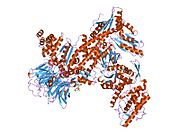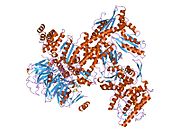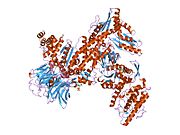ARPC1B
Template:PBB Actin-related protein 2/3 complex subunit 1B is a protein that in humans is encoded by the ARPC1B gene.[1][2][3]
Function
This gene encodes one of seven subunits of the human Arp2/3 protein complex. This subunit is a member of the SOP2 family of proteins and is most similar to the protein encoded by gene ARPC1A. The similarity between these two proteins suggests that they both may function as p41 subunit of the human Arp2/3 complex that has been implicated in the control of actin polymerization in cells. It is possible that the p41 subunit is involved in assembling and maintaining the structure of the Arp2/3 complex. Multiple versions of the p41 subunit may adapt the functions of the complex to different cell types or developmental stages.[3]
Interactions
ARPC1B has been shown to interact with PAK1.[4]
References
- ^ Welch MD, DePace AH, Verma S, Iwamatsu A, Mitchison TJ (Jul 1997). "The human Arp2/3 complex is composed of evolutionarily conserved subunits and is localized to cellular regions of dynamic actin filament assembly". The Journal of Cell Biology. 138 (2): 375–84. doi:10.1083/jcb.138.2.375. PMC 2138188. PMID 9230079.
- ^ Machesky LM, Reeves E, Wientjes F, Mattheyse FJ, Grogan A, Totty NF, Burlingame AL, Hsuan JJ, Segal AW (Nov 1997). "Mammalian actin-related protein 2/3 complex localizes to regions of lamellipodial protrusion and is composed of evolutionarily conserved proteins". The Biochemical Journal. 328 ( Pt 1) (1): 105–12. PMC 1218893. PMID 9359840.
- ^ a b "Entrez Gene: ARPC1B actin related protein 2/3 complex, subunit 1B, 41kDa".
- ^ Vadlamudi RK, Li F, Barnes CJ, Bagheri-Yarmand R, Kumar R (Feb 2004). "p41-Arc subunit of human Arp2/3 complex is a p21-activated kinase-1-interacting substrate". EMBO Reports. 5 (2): 154–60. doi:10.1038/sj.embor.7400079. PMC 1298990. PMID 14749719.
Further reading
- Andersson B, Wentland MA, Ricafrente JY, Liu W, Gibbs RA (Apr 1996). "A "double adaptor" method for improved shotgun library construction". Analytical Biochemistry. 236 (1): 107–13. doi:10.1006/abio.1996.0138. PMID 8619474.
- Welch MD, Iwamatsu A, Mitchison TJ (Jan 1997). "Actin polymerization is induced by Arp2/3 protein complex at the surface of Listeria monocytogenes". Nature. 385 (6613): 265–9. doi:10.1038/385265a0. PMID 9000076.
- Yu W, Andersson B, Worley KC, Muzny DM, Ding Y, Liu W, Ricafrente JY, Wentland MA, Lennon G, Gibbs RA (Apr 1997). "Large-scale concatenation cDNA sequencing". Genome Research. 7 (4): 353–8. doi:10.1101/gr.7.4.353. PMC 139146. PMID 9110174.
- Rassenti LZ, Kipps TJ (Apr 1997). "Lack of allelic exclusion in B cell chronic lymphocytic leukemia". The Journal of Experimental Medicine. 185 (8): 1435–45. doi:10.1084/jem.185.8.1435. PMC 2196272. PMID 9126924.
- Zhao X, Yang Z, Qian M, Zhu X (Jan 2001). "Interactions among subunits of human Arp2/3 complex: p20-Arc as the hub". Biochemical and Biophysical Research Communications. 280 (2): 513–7. doi:10.1006/bbrc.2000.4151. PMID 11162547.
- Volkmann N, Amann KJ, Stoilova-McPhie S, Egile C, Winter DC, Hazelwood L, Heuser JE, Li R, Pollard TD, Hanein D (Sep 2001). "Structure of Arp2/3 complex in its activated state and in actin filament branch junctions". Science. 293 (5539): 2456–9. doi:10.1126/science.1063025. PMID 11533442.
- Robinson RC, Turbedsky K, Kaiser DA, Marchand JB, Higgs HN, Choe S, Pollard TD (Nov 2001). "Crystal structure of Arp2/3 complex". Science. 294 (5547): 1679–84. doi:10.1126/science.1066333. PMID 11721045.
- Gournier H, Goley ED, Niederstrasser H, Trinh T, Welch MD (Nov 2001). "Reconstitution of human Arp2/3 complex reveals critical roles of individual subunits in complex structure and activity". Molecular Cell. 8 (5): 1041–52. doi:10.1016/S1097-2765(01)00393-8. PMID 11741539.
- Hüfner K, Schell B, Aepfelbacher M, Linder S (Mar 2002). "The acidic regions of WASp and N-WASP can synergize with CDC42Hs and Rac1 to induce filopodia and lamellipodia". FEBS Letters. 514 (2–3): 168–74. doi:10.1016/S0014-5793(02)02358-X. PMID 11943145.
- Kaneda A, Kaminishi M, Nakanishi Y, Sugimura T, Ushijima T (Jul 2002). "Reduced expression of the insulin-induced protein 1 and p41 Arp2/3 complex genes in human gastric cancers". International Journal of Cancer. Journal International Du Cancer. 100 (1): 57–62. doi:10.1002/ijc.10464. PMID 12115587.
- Gevaert K, Goethals M, Martens L, Van Damme J, Staes A, Thomas GR, Vandekerckhove J (May 2003). "Exploring proteomes and analyzing protein processing by mass spectrometric identification of sorted N-terminal peptides". Nature Biotechnology. 21 (5): 566–9. doi:10.1038/nbt810. PMID 12665801.
- Vadlamudi RK, Li F, Barnes CJ, Bagheri-Yarmand R, Kumar R (Feb 2004). "p41-Arc subunit of human Arp2/3 complex is a p21-activated kinase-1-interacting substrate". EMBO Reports. 5 (2): 154–60. doi:10.1038/sj.embor.7400079. PMC 1298990. PMID 14749719.
- Kaneda A, Kaminishi M, Sugimura T, Ushijima T (Aug 2004). "Decreased expression of the seven ARP2/3 complex genes in human gastric cancers". Cancer Letters. 212 (2): 203–10. doi:10.1016/j.canlet.2004.03.020. PMID 15279900.
- Andersen JS, Lam YW, Leung AK, Ong SE, Lyon CE, Lamond AI, Mann M (Jan 2005). "Nucleolar proteome dynamics". Nature. 433 (7021): 77–83. doi:10.1038/nature03207. PMID 15635413.
External links
- ARPC1B human gene location in the UCSC Genome Browser.
- ARPC1B human gene details in the UCSC Genome Browser.










